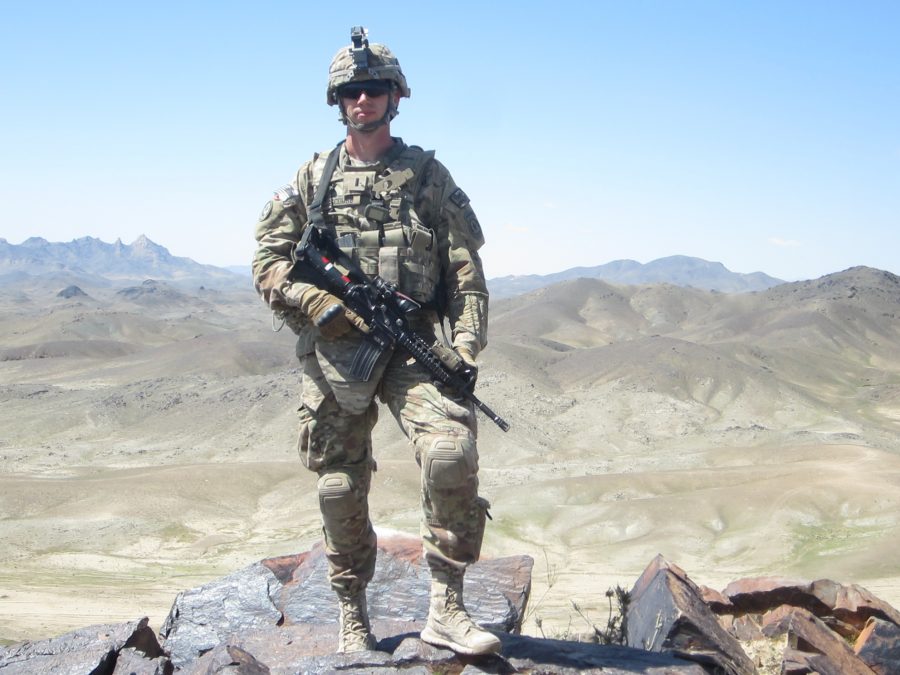From Combat to Classroom, NYU Vets Face Challenges
Army veteran David Luscombe in uniform. He has found a close community with other veterans and the LGBTQ center.
September 22, 2016
Transitioning to life at NYU can be challenging, confusing and expensive — especially for veterans.
According to the most recent statistic from the Veterans Association, there are currently 452 GI Bill students studying undergraduate and graduate coursework at NYU.
Veterans who return to the classroom are not without help. The Post-9/11 GI Bill offers educational benefits to veterans that include university tuition and fees for servicemen and women. The VA’s estimated GI benefits for students at NYU include approximately $21,970 a year for tuition, $3,669 a month for housing costs and $1,000 a year for books.
In addition to GI Bill benefits, veterans are eligible for scholarships through the Yellow Ribbon Program, in which NYU participates. Schools in this program make extra funds available that are then matched by the VA. The amount available to each student depends on what other benefits they receive.
And in May of this year, President Hamilton announced NYU was tripling its Yellow Ribbon funds to $10,000 a year for the 2016-17 school.
Despite these forms of financial support, challenges still exist within the bureaucracy for veterans at NYU.
Alexander Marte, who served as a lance corporal and later a corporal in the Marine Corps from 2008-12, is currently in his second year studying Urban Planning at Wagner and serves as the Chair of the Wagner Military Veterans Groups, which focuses on career development for veterans.
Marte thinks NYU should do more for veterans, especially with housing, which he found extremely difficult. While he understands that NYU can only do so much to help them, Marte wants NYU to have veteran-specific options for housing, such as allowing them to find fellow veterans as roommates.
“I think that NYU tries to do their best but the only important thing that I’m saying is that there should be a professional psychologist and also ways to find housing for veterans,” Marte said. “Many people come from the military and then transition and I think having a liaison to help veterans transition is very necessary.”
He thinks someone in this role could help with things from navigating the GI Bill to mental wellness.
David Luscombe served in the Army as an artillery officer from 2011-15 and is now in his second year pursuing a dual degree MBA/MPA program through Stern and Wagner. He is also the VP of Finance and Operations for the Stern Military Veterans Club.
Luscombe said the school waived some of his application fees, and he applied while serving in Romania. However, he was not able to participate in the in-person interview for Stern.
“I thought NYU during the admissions process was pretty helpful in terms of working with me through the whole affair,” Luscombe said. “Overall they were very supportive, very helpful.”
Luscombe said the NYU veteran community is very tight-knit. His organization recently had a happy hour with an LGBTQ group at Stern to celebrate the fifth anniversary repeal of the “Don’t Ask, Don’t Tell” policy. This Sunday he will run with a group in the Stephen Siller Tunnel To Towers Foundation 5K run, which retraces the path of a 9/11 first responder. The group meets every few weeks and participates in a number of other events and charitable causes.
“I think each individual school has their own veteran organization, and then beyond that NYU as a whole has a veterans organization,” Luscombe said of the veteran community’s dynamic.
However, he feels that NYU can be inflexible and bureaucratic sometimes with the Yellow Ribbon program. Luscombe said that while NYU offered substantial financial support his first year, they offered him nothing for his second year. He was unable to split the support between the two years like he wanted to do, since NYU said it only planned ahead one fiscal year.
“I understand why they do it for the first year and not the second, especially in the MBA [program],” Luscombe said. “Sometimes there’s a hope that you’ll get sponsorship from an employer for your second year.”
VA through the Yellow Ribbon program was being covered by NYU entirely.
“That was such a bummer. I thought it seems like such a trivial [thing],” Luscombe said. “All you have to do is plan it slightly differently and it could make a very meaningful difference in either my or someone else’s life.”
Email Tea Kvetenadze at [email protected].
























































































































































